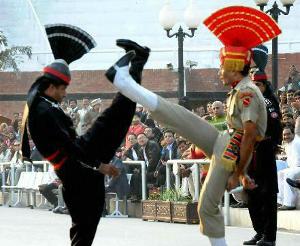Amritsar, Oct 6: With tension prevailing at the border, the traditional exchange of sweets between the troops of India and Pakistan along the Wagah border in Punjab on Eid has been called off.
 Official sources said during a late evening flag meeting between the sector commanders of the Border Security Force and Pakistan Rangers on Sunday, the other side refused to fix a proper time for the ceremony to be held on Monday.
Official sources said during a late evening flag meeting between the sector commanders of the Border Security Force and Pakistan Rangers on Sunday, the other side refused to fix a proper time for the ceremony to be held on Monday.
"The Pakistan side refused the exchange of sweets on Eid today (Monday). They cited no reasons but it is understood that the prevailing tension along J&K border due to unprovoked firing incidents from the other side is the reason," the sources said.
Hence, the BSF did not make any movement along the Wagah border and the border gates remained shut.
The exchange of sweets between border guarding troops of the two countries is an old and traditional gesture, which is aimed to show goodwill and this practice has been continuing for many years now.
The same drill is held during Diwali and Independence day of both the countries.
Senior commanders from both the sides exchange sweets in their official uniforms along the Wagah land border here which is also frequented by locals and tourists from both sides.
Sources, however, said that the evening retreat and lowering of flag ceremony is expected to take place as scheduled for every day.
Five villagers were killed and 29 injured in heavy mortar shelling and firing by Pakistani troops targeting hamlets and outposts along the International Border in Jammu district today in one of the worst ceasefire violations.
Also read: J&K: 5 killed as Pakistan shells Arnia sector’s main bazaar





Comments
Add new comment